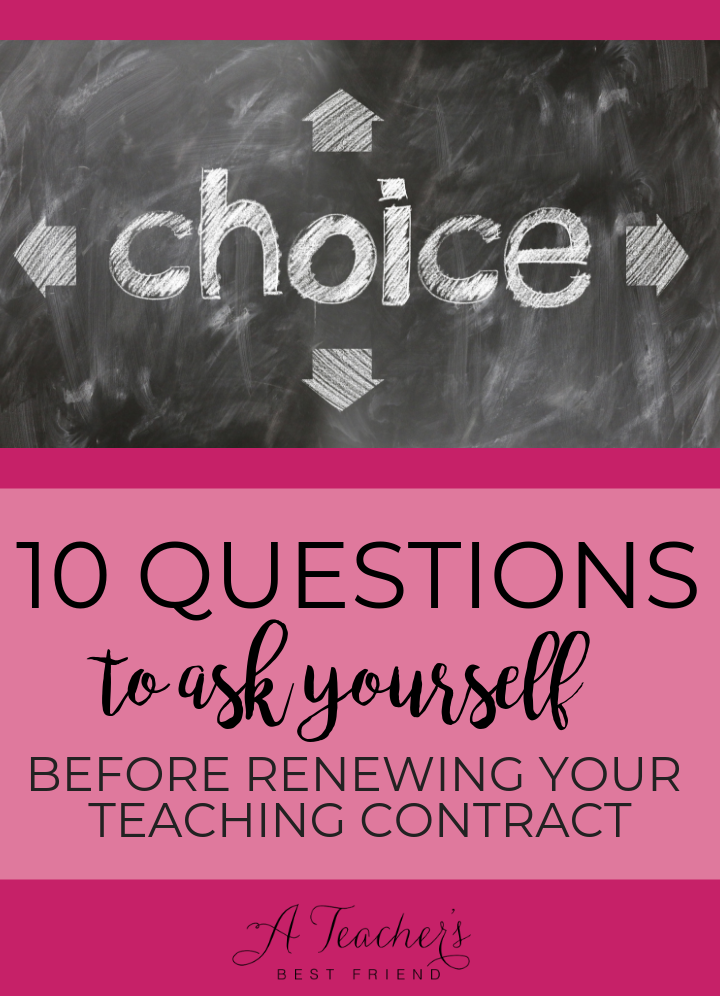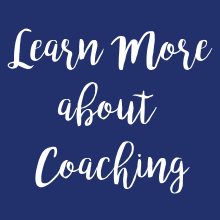
“I’m so exhausted,” she said through tears, “I just don’t know if I can do it another year.” This came from one of the teachers I coach this week in our session. She is fried crispy, overwhelmed, and just ‘done’. And she is also trying to decide whether or not to sign her teaching contract for next year. So – want to know what I asked her? I’m going to share with you 10 questions that you can consider if you find yourself in this predicament.
So let’s first set the intention here: This blog post is to help you seek clarity from within. So much of what we try to determine when we consider signing our contract is validation that what we want to decide is “okay”. I’m going to tell you right now – I’m not going to give you that validation. I don’t know what’s right for you. Only you know that. But I am here to help you uncover what is right for you.
Please know my heart: I don’t like to see good teachers leave the profession. But I do want the teachers that decide to stay in the profession to feel peace, purpose, and passion. I think you deserve that. Frankly – that’s what I want for you regardless of whether you stay in the profession or not. So, with that being said, let’s dive in to the questions.
Getting Started
I suggest you grab a journal or notebook and simply journal your answers to these questions. Don’t judge yourself as you reflect on them. Let your feelings, concerns, worries, and intuitions flow. Let your journal be the place where those feelings can be expressed without judgement, guilt, or shame.
The Questions
- What is going on right now? Describe the context in which you are making this decision. (e.g. “I’m exhausted and burned out. I don’t feel supported. I’ve got several deadlines looming. I am the primary provider for my family. I have a lot/little support. etc.) Take a moment to simply validate the situation you are in. Be grateful for the things you listed that help you. Honor and extend compassion to yourself for the things you listed that are making this a hard time to make this decision. Also ask yourself, is this moment the right time to contemplate this decision? If you are depleted and stressed, you may not have the capacity to think clearly about such a big decision. You may want to re-engage in this activity when you are rested and less stressed. (My vote: Saturday morning at a coffee shop with your favorite drink in hand).
- What MUST change next year regardless of what you choose? Are there some issues that you are having this year that definitely need to change for next year (e.g. health or stress-related issues, colleague issues, performance issues etc.)? What absolutely cannot continue? What must change?
- What does staying represent to you? What does leaving represent to you? This is a really important one because we sometimes associate leaving with failure and staying with success. Therefore we see staying as our only real option unless we raise our white flag and surrender defeat. I see it differently. I like to think failure would be making a thoughtless, impulsive, or clouded decision and success is making a thoughtful, confident, clear decision you can feel peaceful about no matter what the outcome is. Challenge what your choice represents and whether or not that feels right to you.
- What are your options here? Go beyond sign the contract vs. don’t sign the contract. (e.g. Sign and stay in this assignment, sign but change role, don’t sign but stay in teaching, don’t sign and leave the profession altogether etc.) Get out of your proverbial “box” here. Challenge yourself to think of at least one more option even when you think you are done.
- For each of your options listed, what assumptions are you making about those options? (e.g. “I’m assuming leaving will be less stressful” etc.) Are these fair assumptions?
- What would have to happen in order for you to stay and be happy? What would have to happen in order for you to leave and be happy? You could ask this question for each of your options. What would you have to do in each instance to make it a good decision? This will bring up the ways that you’ll need to adjust to each option in order to make it a good one. For example, you may think “To stay in teaching, I’ll have to work less hours and spend more time with my family.” GREAT! Now you’ve uncovered a major priority for next year should you decide to sign that contract.
Making the Decision
My last four questions have to do with decision-making rather than the actual choices and context related to your teaching career. These questions come up time and again with my clients because there are often things that make the decision hard that have nothing to do with the actual quality of their options. See if any of these resonate for you:
- How do you usually make good decisions? When have you made a decision in the past that you felt really peaceful and confident about? Write about what made that decision feel good and what your process was like in making that decision. What can you take from that experience and apply here? You may pray about it, consult people you trust, read, learn, or spend time in quiet reflection about it. Have you done those things yet for this decision? If not – go ahead!
- What is the hardest part of making this decision? What are your ‘sticking points’ that you just keep coming back to? Where do you think that comes from? For example, some clients have a hard time because they get stuck by a fear of a future feeling of regret. When we dig into what is so scary about regret, we sometimes uncover that regret isn’t so scary and that’s a part of life that is inevitable to feel sometimes. It is also usually most prevalent for my clients when they actually saw the red flags and didn’t listen to their intuition about it. By working through that fear, they finally feel free to listen to their intuition and make the decision. That’s just one example of fears that can keep us stuck. So, what might be keeping you ‘stuck’ in this decision?
- Who is making this decision? This may seem obvious to some of you – “It’s ME!” But for others of us, there can be a lot of people who are giving input into the decision (rightly or not-rightly) or we feel we need to please someone else with the decision. Are there others’ opinions that are influencing you here? How do you feel about that?
- Once you make the decision, what do you need to do to make sure you don’t KEEP worrying about it? This is a problem for many of my clients. They feel like they made a decision, but then they keep ruminating on the decision and therefore feel like they haven’t really ‘officially’ made it. Sometimes, once you make the decision, you simply need to focus on what you can do to make that decision the right decision, rather than continue to ask yourself if it is the right decision. But that is a lot easier said than done. So get support here if you need it.
On that note, here is where I plug why coaching can be so helpful… These questions are BIG and HARD. Often these questions require follow up questions to truly examine what is going on in your heart when you answer them. And that is where a coach can really help in this process. If you are struggling to find clarity as you answer these questions, reach out to me and set up some time for us to talk! I would love to walk with you through this decision. The fact that you’ve already thought through these questions will make coaching even more effective and efficient.
I hope that you can find peace and confidence in the decision in front of you. And no matter what you decide, if you need someone to listen, encourage, and support you – I’m here for you!
All my love,




Leave a Reply